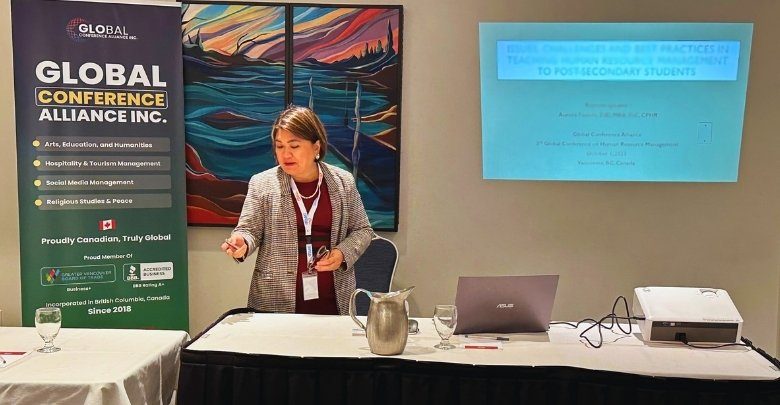Economics conferences in Canada serve as vital platforms for researchers, policymakers, and industry leaders to share insights and create collaboration. These gatherings cover a wide range of topics, enhancing the perception of economic trends and challenges. You may be asking yourself, “How do I apply to present my research at an economics conference in Canada?”
To apply, begin by identifying the conference that aligns with your research interests. Review the submission guidelines carefully, prepare a compelling presentation proposal, and ensure you meet all requirements before submitting your application. Meeting deadlines and adhering to guidelines are essential for success in your application.
Are you eager to learn more about the process? This article will provide all the necessary information on applying to present your research, so you can make the most of your conference experience in Canada.
Significance of Economics Conferences in Canada
Economics conferences in Canada play a crucial role in developing collaboration and knowledge exchange. They serve as platforms for researchers and practitioners to discuss pressing economic issues, share innovative ideas, and network with peers. Such events not only enhance individual expertise but also contribute to the advancement of the economics field as a whole.
Conferences often feature keynote speakers who are leaders in their fields. These experts share valuable insights on current trends, research developments, and policy implications. Additionally, conferences provide attendees with the opportunity to engage in discussions that shape economic policies and practices.
Moreover, economics conferences encourage interdisciplinary collaboration. By bringing together participants from diverse backgrounds, these events facilitate the exchange of ideas and strategies that can address complex economic challenges.
How Do I Apply to Present My Research at an Economics Conference in Canada?
Applying to present your research at an economics conference in Canada involves several steps. Here’s a detailed breakdown of the application process, including what you need to know to increase your chances of acceptance.
Step 1: Identify the Right Conference
Begin by researching upcoming economics conferences in Canada. Look for conferences that align with your research interests and expertise. Each conference typically has its own theme or focus area, so make sure your research fits well within the scope of the conference.
Step 2: Review Submission Guidelines
Once you’ve identified a suitable conference, review the submission guidelines carefully. These guidelines will provide critical information about the application process, including formatting requirements and submission deadlines. Pay attention to details, as adherence to the guidelines is essential for a successful application.
Step 3: Prepare Your Presentation Proposal
write a compelling proposal that clearly outlines your research objectives, methodology, and findings. Your proposal should effectively communicate the significance of your research to the conference audience. Include key points that demonstrate how your work contributes to the field of economics.
- Abstract: Write a concise abstract summarizing your research. This should be a brief overview that captures the essence of your work. Keep it engaging to entice reviewers to consider your proposal seriously.
- Objectives: Clearly state the objectives of your research. This helps the selection committee understand the purpose of your work and its relevance to the conference theme.
- Methodology: Provide a brief description of the methodology used in your research. Explain how you conducted your study and why you chose this approach.
- Findings: Highlight the key findings of your research. What did you discover? Why are these findings important? This section is crucial for demonstrating the impact of your work.
- Conclusion: Summarize the main points of your proposal. Reinforce the significance of your research and its contributions to the field.
Step 4: Submit Your Application
After preparing your proposal, submit it according to the conference’s guidelines. Ensure that you include all required documents and information. Double-check for any specific requirements related to formatting or additional materials.
Step 5: Await the Review Process
Once submitted, your proposal will undergo a review process. This may take several weeks, so be patient. During this time, the conference organizers will evaluate your submission based on its relevance, originality, and quality.
Step 6: Prepare for Acceptance
If your proposal is accepted, you will receive a notification from the conference organizers. This will include details on how to register for the conference and any additional requirements. It is essential to respond promptly to any requests for further information or documentation.
Step 7: Finalize Your Presentation
Once registered, focus on preparing your presentation. Make sure to practice your delivery, focusing on clarity and engagement. Prepare visual aids if applicable, and ensure they are professionally designed.
By following these steps, you can confidently manage the application process for presenting your research at an economics conference in Canada. That’s how attending the upcoming international economics conference in Canada can improve your professional profile and contribute to your growth in the field of economics.
What Are the Requirements for Presentation Proposals?
When applying to present at an economics conference in Canada, it’s important to be aware of the specific requirements for presentation proposals. These requirements can vary between conferences, but there are common elements you should include to ensure your proposal is complete and competitive.
Understanding Submission Guidelines
Most conferences will have a set of submission guidelines available on their websites. These guidelines outline how to format your proposal, what information to include, and any restrictions on the length. Familiarizing yourself with these details is crucial.
- Formatting: Follow the specified formatting requirements. This might include font type, size, and layout. Proper formatting upgrades the professionalism of your proposal.
- Length: Pay attention to any word or page limits. Submitting a proposal that exceeds these limits can result in disqualification.
Required Documentation
In addition to your proposal, you may need to submit other documents. Commonly required documents include:
- Curriculum Vitae (CV): A brief CV detailing your academic and professional background may be required. This helps the committee understand your qualifications.
- Cover Letter: Some conferences may ask for a cover letter introducing yourself and your research. This letter should convey your enthusiasm for presenting at the conference.
- References: Occasionally, conferences require references or letters of recommendation from colleagues. These can strengthen your application.
Research Relevance
Ensure your research aligns with the conference theme. Review past topics and presentations to gauge what has been covered previously. Highlighting the relevance of your work can significantly increase your chances of acceptance.
Originality and Innovation
Conferences are keen on original and innovative research. Your proposal should clearly indicate how your work contributes new insights to the field. Be specific about what makes your research unique. You should always write a research paper with the attendees of economics conferences in Canada in mind, as they are interested in fresh perspectives on current economic issues.
Feedback and Collaboration
If possible, seek feedback on your proposal from colleagues before submission. They may offer valuable insights or catch errors you missed. Collaboration can improve the quality of your proposal significantly.
How to Prepare Your Research Paper for Submission
Preparing your research paper for submission to an economics conference requires careful planning and attention to detail. The quality of your paper can significantly impact your chances of acceptance. Here’s how to ensure your research paper meets the necessary standards.
Review Submission Guidelines
Before you start writing, review the conference’s submission guidelines. These will provide specific information about formatting, length, and required sections. Following these guidelines is critical to presenting your research professionally.
Structure Your Paper
Organize your paper into clear sections. A typical structure includes an introduction, literature review, methodology, results, and conclusion. This format helps convey your research logically.
- Introduction: Introduce your research topic and its significance. Clearly state your research question or hypothesis.
- Literature Review: Summarize existing research related to your topic. Highlight gaps in the literature that your research addresses.
- Methodology: Describe the methods used in your research. Be specific about data collection and analysis techniques.
- Results: Present your findings clearly and concisely. Use tables or graphs if necessary to illustrate your results.
- Conclusion: Summarize the main findings and their implications. Discuss how your research contributes to the field.
Edit and Revise
Once your paper is drafted, take the time to edit and revise it thoroughly. Look for grammatical errors, unclear sentences, and inconsistencies in your argument. Consider having a colleague review your paper for additional feedback. Additionally, setting it aside for a day or two can help you approach the revision process with fresh eyes, allowing you to catch mistakes you might have missed initially.
Cite Your Sources
Properly cite all sources used in your research. This demonstrates academic integrity and provides a basis for your work. Ensure that your citations follow the format specified in the conference guidelines. Accurate citations also enhance the credibility of your paper, showing that you have engaged with existing literature and built upon previous research effectively.
Prepare for Submission
When you are satisfied with your research paper, prepare it for submission. Ensure it meets all formatting requirements and includes any necessary supplementary materials, such as a cover letter or abstract. Carefully double-check the conference’s submission guidelines for any specific requirements that may have been updated or clarified.
Preparing your research paper for submission is crucial for making a strong impression at an economics conference. If you find that you’re not ready to submit a paper, remember that attending economics conferences without paper submission is also a valuable opportunity to learn and network. Engaging with other researchers can provide insights that may enhance your future work, even if you are not presenting this time.
Tips for a Successful Presentation at the Conference
Presenting your research at an economics conference can be a rewarding experience. Here are some tips to ensure your presentation is successful.
- Know Your Audience: Understand who will be attending your session. Customize your presentation to suit their interests and level of expertise. Engaging your audience will lead to more meaningful discussions.
- Practice Your Delivery: Rehearse your presentation multiple times. This will help you become familiar with the content and reduce anxiety. Practicing in front of colleagues can provide valuable feedback.
- Use Visual Aids: Incorporate visual aids to improve your presentation. Slides, charts, and graphs can help convey complex information clearly. Ensure that your visuals are easy to read and relevant to your content.
- Encourage Questions: Invite questions from the audience during or after your presentation. This interaction can lead to valuable discussions and insights. Be open to feedback and differing viewpoints.
By following these tips, you can make a positive impact during your presentation at the economics conference. A successful presentation not only increases your visibility but also develops connections within the academic community.
What to Expect After Your Application Is Accepted?
Receiving an acceptance for your research presentation at an economics conference is an exciting milestone. It’s a significant step in your academic or professional journey. Here’s what you can expect next to ensure you’re well-prepared for the upcoming event.
Registration Details
After acceptance, you will need to complete your registration for the conference. This will include paying any associated fees. Ensure you follow the registration guidelines provided by the conference organizers. Also, keep track of deadlines to avoid any last-minute issues.
Prepare Your Presentation
Once registered, focus on preparing your presentation. Review the time allocated for your talk and structure your content accordingly. Practice delivering your presentation to ensure you remain within the time limit. It’s helpful to rehearse in front of peers for constructive feedback.
Conference Schedule
Keep an eye on the conference schedule for updates. You may be assigned a specific time slot for your presentation. Being aware of the schedule helps you plan your conference experience effectively. Familiarize yourself with other sessions that might interest you during the event.
Networking Opportunities
Prepare for networking opportunities during the conference. Engage with fellow attendees, speakers, and industry leaders. Building these connections can be beneficial for your career and research. Consider setting goals for the number of new contacts you wish to make during the conference.
Frequently Asked Questions
Applying to present your research at an economics conference can be an exciting opportunity. It allows you to share your work, connect with peers, and gain valuable feedback. Below are some common questions related to the application process, along with their answers to help guide you.
What Are the Eligibility Criteria for Presenting at an Economics Conference?
Eligibility criteria may vary by conference but generally include having a completed research paper or project related to economics. Some conferences may prioritize graduate students, professionals, or specific themes. Always check the conference’s official website for detailed requirements to ensure your submission aligns with their guidelines.
How Do I Submit My Research Proposal?
To submit your research proposal, visit the conference website for specific submission guidelines. Most conferences require you to submit an abstract outlining your research objectives, methodology, and key findings. Ensure your proposal meets the word limit and formatting requirements specified by the conference organizers.
When Is the Deadline for Submissions?
Submission deadlines for presenting research typically vary by conference and are often several months before the event date. It’s essential to stay updated on the specific deadlines for the conferences you’re interested in. Mark these dates on your calendar to ensure you have ample time to prepare your proposal and any required documents.
What Should I Include in My Presentation?
Your presentation should include an overview of your research, key findings, and implications for the field of economics. Use visuals, such as slides or charts, to enhance your presentation and make it engaging. Additionally, prepare to answer questions from the audience to facilitate discussion and feedback.
Can I Present as Part of a Group or Team?
Yes, many conferences allow group presentations, provided all team members contribute to the research. When submitting your proposal, include the names and affiliations of all presenters. Make sure to clearly outline each member’s role in the project and how the presentation will be structured.
Final Words
Attending an economics conference in Canada can be a significant opportunity for professional growth. It allows you to engage with experts and peers, sharing insights and expanding your knowledge in the field. The experience can improve your awareness of key issues in economics while providing a platform to showcase your research.
If you’re wondering how do I apply to present my research at an economics conference in Canada? the process involves several steps. Start by researching conferences that align with your work, and then prepare a strong proposal. Be sure to follow the submission guidelines carefully, as this will increase your chances of acceptance and success.








